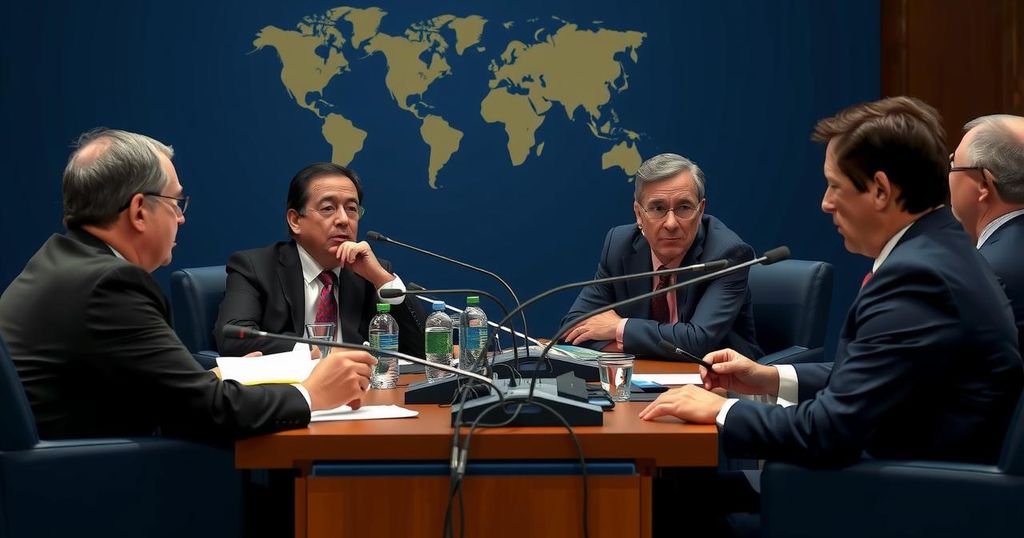Contentious Climate Finance Deal Reached at COP29 Amidst Delegations’ Anger

COP29 in Baku resulted in a controversial climate finance deal mandating wealthy nations to provide $300 billion annually to poorer countries. The announcement sparked immediate outcry, particularly from India and Cuba, who deemed the amount insufficient. President Babayev hailed the achievement despite the dissent, underscoring ongoing tensions in climate diplomacy.
In a tense finale to the COP29 climate talks in Baku, Azerbaijan, lasting negotiations culminated in the adoption of a controversial climate finance deal. The agreement, which was reached following extended discussions into the early hours of Sunday morning, commits wealthy nations to provide $300 billion annually to poorer countries disproportionately affected by climate change. This significant moment was marred by swift denouncements from various nations, including India and Cuba, who criticized the agreement as insufficient and expressed disappointment over perceived procedural injustices during the negotiations.
The conclave was characterized by intense deliberations as representatives sought to navigate the complex landscape of climate diplomacy. After days of arduous negotiations, COP president Mukhtar Babayev announced the deal in a plenary session that stirred both applause and anger among delegates. Notably, many participants had appeared fatigued and rushed, indicative of the pressing nature of these negotiations. The discussions took place inside a makeshift venue that transformed Azerbaijan’s Olympic Stadium into a hub for global climate action, though it drew scrutiny for Azerbaijan’s broader human rights record and its commitment to fossil fuels.
In the aftermath of the agreement, the reaction from various delegations was swift. The representative from India, Chandni Raina, vehemently criticized the $300 billion commitment, describing it as “abysmally low,” and accused the COP leadership of ignoring vital objections in favor of a scripted conclusion. Other representatives echoed similar frustrations, reinforcing feelings of discontent amongst developing nations who feel marginalized in the discussions of climate financing. As climate activists observed from the sidelines, the event underscored the ongoing tensions between developed and developing countries regarding climate action responsibilities.
Despite the criticism, President Babayev remarked on the achievement of reaching a consensus, stating, “Since the beginning of this journey, people doubted that Azerbaijan could deliver. They doubted that everyone could agree. They were wrong on both.” His comments reflected a sense of vindication for the host nation, albeit against the backdrop of significant dissent amongst various delegations. Such divergent perceptions underscore the ongoing challenges and inequalities within international climate negotiations.
The COP29 talks in Baku were positioned amid escalating concerns about climate change, particularly during a year projected to be one of the hottest on record. The discussions revolved around climate finance, which is crucial for assisting less developed countries in mitigating the impacts of climate change. Financial commitments from wealthier nations to poorer nations are pivotal to addressing the ongoing global climate crisis, yet significant disputes often arise over the adequacy and implementation of these commitments. The tensions evident at COP29 illustrate the broader challenges in reconciling differing national interests among nations with varying economic resources and climate change vulnerabilities.
The COP29 climate talks were marked by significant achievements and profound disappointment among delegations. The agreement to mobilize $300 billion for vulnerable countries, while lauded by some, was deemed inadequate by key players such as India and Cuba. The contrasting reactions highlighted the deep fractures in climate diplomacy, where allegations of procedural shortcomings fueled discontent. Moving forward, it is clear that addressing these disparities in climate financing will be essential to fostering cooperation in the global response to climate change.
Original Source: www.france24.com






